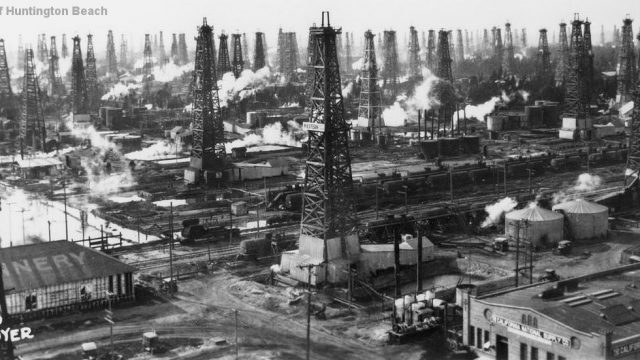The Malthusians Have Been Wrong About Peak Oil For More Than A Century

We were supposed to have run out of oil by now. Yet here we are, with surging domestic oil production and falling gas prices.
What the hell happened?
The end of oil was first predicted in 1909, according to this handy timeline from Gizmodo. We heard that the end of oil was near again in 1919. And then again in 1937. And 1943. And 1945.
“M. King Hubbert of the Shell Development Co. predicted [one year ago] that peak oil production would be reached in the next 10 to 15 years and after that would gradually decline,” reported the Corpus Christ Times in 1957.
“A geologist stuck a figurative dipstick into the United States’ oil supplies Tuesday and estimated that the country may be dry in 10 years,” reported the Brandon Sun in 1966.
[mks_pullquote align=”right” width=”300″ size=”24″ bg_color=”#000000″ txt_color=”#ffffff”]”Where Malthus and the ‘peak oil’ demagogues got it wrong was in failing to account for mankind’s ability to invent and innovate. Malthus assumed that the only way to get more food was to plant more crops. He didn’t consider that we might development technologies allowing us to get more crop per acre of ground, and to harvest ground faster so that we might grow more crops on an acre of land per season. The peak oil folks, too, kept assuming that we’d never find new ways to squeeze oil out of the ground.”[/mks_pullquote]
“At any rate, U.S. oil supplies will last only 20 years. Foreign supplies will last 40 or 50 years, but are increasingly dependent upon world politics,” an article in the Bulletin of Atomic Scientists concluded in 1972.
“We must recognize that world oil production will likely peak in the early 1990’s, and from that point on will be on a declining curve,” the Organizing Act which created the U.S. Department of Energy stated in 1977.
“Unfortunately, oil production will likely peak by 2020 and start declining. Without a change, developing countries will ultimately be left in the dark, and developed countries will struggle to keep the lights on. Conflict is inevitable. My guess is that this won’t become a big issue unless there is a thalidomide event. We will have to see in the rear-view mirror that we are past the peak in worldwide oil production,” Robert Smallery, a Nobel Laureate in Chemistry, predicted in 1996.
Now it seems peak oil is supposed to arrive with in the next few decades. “Most studies estimate that oil production will peak sometime between now and 2040,” a report from the Government Accountability Office claimed in 2007.
But even that prediction is likely out of date now, coming as it did a couple of years before the beginning of the shale oil boom here in America that opened up entire new oceans of oil reserves.
So how is it that so many people – some of them the brightest minds our society has to offer – have gotten this wrong again and again?
They made the same mistake Thomas Malthus made in 1798 when he wrote infamous Essay on the Principle of Population (Malthus lends his name to the Malthusian school of economic thought). Malthus believed that population growth would outstrip food production, and thus agriculture would serve as a check on population growth once we had more people than we could feed. He had dark predictions of starvation and misery for this time, except his predictions never really came true.
Kind of like how the “peak oil” stuff has never really come true. Our population keeps growing, but we haven’t yet outgrown our capacity to produce food (I’d argue that places in the world that face famine do so because of issues war and politics as opposed to food production). Our demand for oil keeps growing, and we keep producing more to meet it.
Where Malthus and the “peak oil” demagogues got it wrong was in failing to account for mankind’s ability to invent and innovate. Malthus assumed that the only way to get more food was to plant more crops. He didn’t consider that we might development technologies allowing us to get more crop per acre of ground, and to harvest ground faster so that we might grow more crops on an acre of land per season.
The peak oil folks, too, kept assuming that we’d never find new ways to squeeze oil out of the ground. The didn’t foresee innovations like horizontal drilling and hydraulic fracturing which have turned oil reserves previously thought to be unreachable into bustling fields of development.
They. Were. Wrong.
Which ought to serve as a cautionary tale for those who tell us, with absolute certainty, how things will be in the future. Ironically, the Gizmodo author writes at the end of his piece that our ability to continually defy the notions of Malthusian economics is all the more reason to institute government policies forcing us away from oil.
“If anything should become clear by reading these predictions it’s that we can’t wait for oil to disappear before we wean ourselves from it,” Matt Novak writes. “We have some significant momentum, but there’s a very real danger of slipping back into oil’s warm, wet embrace. It’s comfortable, it’s familiar, and it’s irreparably harming our chances at long-term existence on this planet.”
But what are fanatically certain predictions of global warming – excuse me, climate change – doom if not another flavor of Malthusian prediction, doomed to be wrong?




